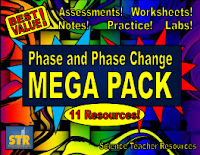In addition, click here to download the FREE resources described below.
 Vocabulary Introduction:
Vocabulary Introduction: When introducing new and key terms, this strategy has proved successful for my students, as it provides them not only a list of defined terms, but requires them to analyze definitions as they write them.
Given a vocabulary worksheet, definition list, and textbook, students must choose and record the correct definition from the definition list and record it on the vocabulary worksheet. To help them select the correct definitions, a textbook is also provided. By asking students to choose a definition similar in meaning to that in their text (rather than simply copy a definition from the text), students are required to analyze and compare definitions, improving the probability of learning.
While students still require practice and regular use of terms to solidify learning, this slight change in the process of defining key terms makes a world of difference.
Vocabulary Review:
This is one of the best vocabulary review games I've used:
1. The focus of the game is student to student discourse.
2. It's transferable - It can be used for any topic with any vocabulary words.
3. Kids LOVE it.
Student groups of four (two students per team - a reader and a guesser) are given a timer and a set of index cards with one key term on each card. For a 60 or 90 second round (student choice), the reader begins by describing the term on the first card while the guesser attempts to say guess it. If the guesser successfully guesses the term, a point is scored, and the reader moves to the next card. If the reader decides to skip/pass on a card, the point goes to the other team.
While this is going on, the other team is looking over the reader's shoulder, making sure that he/she doesn't say the word on the card. If the reader does, the point belongs to the other team, and the reader moves to the next card.
At the end of the round, ALL cards get reshuffled and handed to the other teams, and roles reverse.
At best, students are discussing with each other the key terms and what they mean. At worst, students are listening to others describe words. Either way, it's a big time learning opportunity.
How do you teach vocabulary in the classroom? I'd love to hear any tips/strategies in the comments below!
-Jeff






























